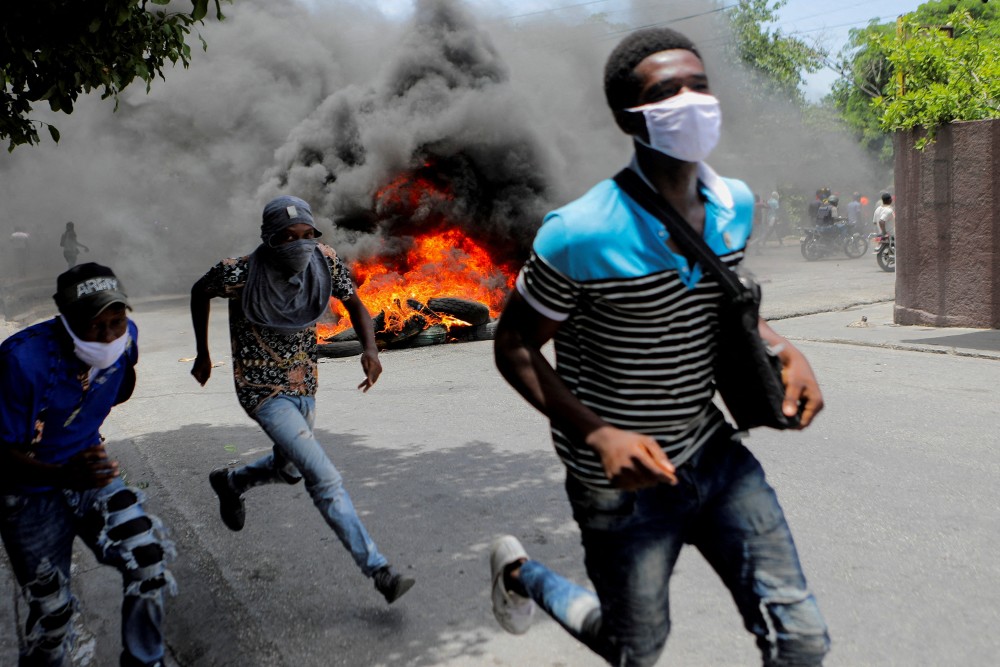
PROSPECT HEIGHTS — Amid a period of turmoil and uncertainty, the Catholic bishops of Haiti are calling for an end to “all acts aimed at reducing Haiti to rubble and ashes,” and for renewed support from the international community to help foster peace and reconciliation.
“In the face of the delirious atrocity to which our country is prey — homicides, settling of scores, witch-hunts, scenes of looting and other acts of violence — we express our deep concern and sorrow following Pope Francis, who is very close to the Haitian people,” the Haitian bishops said in a statement.
An already tumultuous situation in the Caribbean nation has boiled over in recent weeks, with gangs taking control of 80% of the nation’s capital, Port-au-Prince, and cutting off crucial supplies of food, fuel, and water, and Prime Minister Ariel Henry has announced his resignation from his post.
The latest reports indicate that early on March 18 gangs attacked two upscale neighborhoods in Port-au-Prince, killing at least a dozen people. Haiti’s power company also announced that four substations were destroyed, leaving the capital and a few surrounding areas without power.
Meanwhile, the international community has struggled to get a transitional government off the ground. The Haitian bishops, in their March 18 statement, encouraged the transitional government’s creation as an important step to begin to restore peace and security. The U.S. State Department has already committed more than $100 million to help establish a transitional government and for humanitarian aid.
“The Haitian Catholic Bishops’ Conference is in line with the new call for an end to the violence in Haiti, for peace and reconciliation launched recently by Pope Francis,” the Haitian bishops said. “We encourage the efforts of all sectors and forces of the nation to find a solution to the current crisis and restore peace and security for all the sons and daughters of the Haitian nation, by providing the country with a form of inclusive transitional government.”
The statement was signed by Archbishop Max Leroy Mesidor of Port-au-Prince, president of the Episcopal Conference of Haiti (CEH); Bishop Pierre André Dumas of Évêque d’Anse-à-Veau and Miragoâne, vice president of CEH; Cardinal Chibly Langlois of Les Cayes; Archbishop Launay Saturne of Cap-Haïtien; Bishop Joseph Gontrand Décoste of Jérémie; Bishop Désinord Jean of Hinche; Bishop Quesnel Alphonse of Fort-Liberté; Bishop Marie Erick Glandas Toussaint of Jacmel; Bishop Yves Marie Pean of Gonaïves; and Bishop Charles Peters Barthelus of Port-de-Paix.
In their statement, the Haitian church leaders clarified that they have not inquired about there being anyone on the presidential council, or any other government structure to represent the Church, “in order to maintain the moral distance that enables [CEH] to fulfill its prophetic mission.”
“Nevertheless, we hope that the current talks will lead to a genuine, inclusive, and lasting patriotic agreement, in the interests of all the Haitian people, who so long for peace and well-being,” they said.
Until a government is established, the bishops called for Haitians to refrain from violence.
“While we await the establishment of the institutional bodies that will bring the transition to a successful conclusion, we invite all Haitians, without distinction, to refrain from fuelling violence, because violence begets violence, hatred begets more hatred, and death begets more death,” the bishops said in their statement. “Each destruction sets Haiti back or delays its march toward the progress we all desire. Every violent death committed against a human being is a wound in human flesh.”
The Haitian bishops’ statement was the first they’ve issued since Henry announced his resignation. They closed by praying for the intercession of the Blessed Virgin Mary.
“May the Blessed Virgin Mary, whom we invoke in Haiti under the name of Our Lady of Perpetual Help, come to our aid and may, through her intercession, God raise us up and deliver us from evil!” they said.
